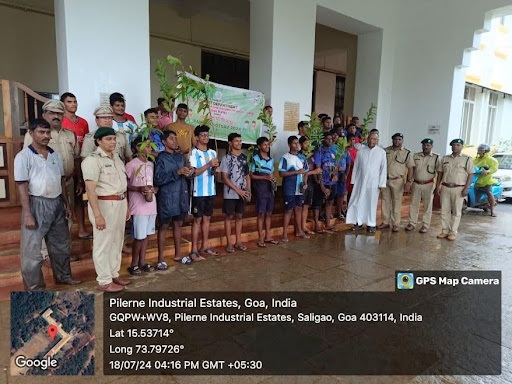
When Mother Earth cries, her children ought to panic. Mothers and Mother Earth do not cry easily. If Mother Earth is crying, that means her children have and are abusing her. Today the cry of Mother Earth is a cry of desperation because she is finding it increasingly difficult to take care of her children. Thankfully, some of her younger children are beginning to recognise the anguish of Mother Earth, while others remain in oblivion and continue to exploit her mercilessly.
In 1972 a group of concerned children of Mother Earth got together in Rome to discuss her anguish and formed an informal international association now known as Club of Rome and published a prescient and anguishing report ‘The Limit of Growth’led by a woman Donella Meadows. Women are attuned to the cries of pain and have an impulse to respond.
At the rocky hilltop of Saligao an impressive and stimulating laboratory is emerging where a choreography of agronomics, land and farm management, cultivation, water management, water harvesting, agroeconomics and human solidarity is in full action. It is a laboratory to learn to embrace mother earth and live “well.”
The long-standing academic institution, Seminary of Our Lady, which means plant nursery or breeding ground (latin: seminarium) at the hilltop is the prime mover led by the congenital farmer Fr. Valeriano Vaz, whose default mode is to cultivate. He is genuinely animated by the incessant calls of Pope Francis to take care of Mother Earth. “Laudato Si’ is an encyclical of Pope Francis published in May 2015. It focuses on care for the natural environment and all people, as well as broader questions of the relationship between God, humans, and the Earth. The encyclical’s subtitle, “Care for Our Common Home,” has grabbed the world’s attention and has become the driving force for environmental policies around the world regardless of creed or belief. Taking care of our common home is a human endeavor we all must embrace with a sense of urgency. The seminarians at this storied institution standing on the hill as the beacon of contemplation, discernment, cultivation and engendering the goodness of God’s Creation, have enthusiastically embraced the “care of our common home” to do Laudato Si – Praised Be You!
The unstinted collaboration of Social Forestry Parks and Garden, Pilerne and Saligao Panchayats, Goa State Biodiversity Board, Le Meridien, and Goa With Earth, a far sighted project of the Seminary of Our Lady, which educates the students of the Seminary to promote organic farming through organic manure from food residue, is notable and speaks volumes that the task to alleviate the cry of the Mother Earth is a collaborative endeavor where all hands are on deck and deep in soil. David De Sousa, an unassuming but committed environmentalist, a thoughtful and innovative agricultural economist, toils in the shadow of the quiet transformation on the hilltop.
The rainwater harvesting projects at the hilltop deserve to be studied and implemented all over Goa. At the Saligao Hilltop the assortment of plants, from fruit-bearing trees to forestry types decorate the fertile landscape of the once rocky hilltop. The thoughtful curation of the land to optimise its natural abilities is at full display. It is a place to envision what else could be done throughout Goa to embrace Mother Earth and at the same time live “well.” It is a place to engage with the soil and experience its wealth and discover oneself and heal one’s spirit. It is a therapeutic place to rehabilitate emotional and spiritual wellbeing.
While Goa’s city and village streets are increasingly non-navigable with potholes at every few feet, the terrain at Saligao Hilltop is delightfully ambulatory with fresh air to breathe and enough peacefulness to contemplate and embrace Mother Earth.
Pope Francis in Laudato Si outlines steps a person can take in the process of ecological conversion. which includes prayer and contemplation, learning more about nature, observance of the Sabbath day of rest, and reduced participation in materialistic forms of consumer culture. A step as simple as giving thanks at mealtime can be a reminder of integral ecology and an individual’s relation to God, nature, and other people.
It is important to note that even if every individual is environmentally engaged in their personal mindset and lifestyle, this would not be enough to stop problems like the climate crisis and pollution. That is because the main decisions impacting the availability of renewable energy and sustainable practices are not made by individuals, but by governments and large corporations.
But we will do our part… Local schools and agricultural colleges would greatly benefit from holding, at least, a week-long camp and get connected with Mother Earth. Local youth organisations would greatly benefit from spending a few days touching the soil and feeling Mother Earth and experiencing her benevolence towards all creatures. The Rector of the Seminary of Our Lady has the hilltop and the doors of the Seminary wide open for the seekers of transformative experience by engaging with the soil of Mother Earth.